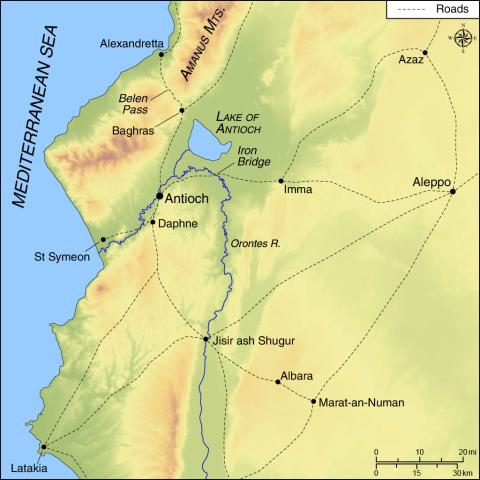The Lake Battle
[6.17.5] Videntēs autem aliae aciēs quod vēxillum Boamundī tam honestē esset ante aliōs dēlātum, īlicō rediērunt retrōrsum, nostrīque ūnanimiter invāsērunt Turcōs; quī omnēs stupefactī arripuērunt fugam. Nostrī itaque persecūtī sunt illōs et dētruncāvērunt usque ad pontem Farreum. Reversī sunt autem Turcī festīnanter in castrum suum, accēpēruntque omnia quae ibi reperīre potuērunt, tōtumque castrum spoliāvērunt, mīsēruntque ignem et fūgērunt. Armēniī et Syrānī scientēs Turcōs omnīnō perdidisse bellum, exiērunt et excubāvērunt per arta loca, et occīdērunt et apprehendērunt multōs ex eīs.
[6.17.6] Superātī sunt itaque, Deō annuente, in illō diē inimīcī nostrī. Satis vērō recuperātī sunt nostrī dē equīs et dē aliīs multīs quae erant illīs valdē necessāria. Et centum capita mortuōrum dētulērunt ante portam cīvitātis, ubi lēgātī ammirātī Babylōniae castramētātī fuerant quī mittēbantur seniōribus. Illī quī remānserant in tentōriīs, tōtā diē proeliātī sunt cum illīs quī erant in cīvitāte, ante trēs portās cīvitātis. Factum est hōc bellum in diē Martis ante caput Iēiūniī, quīntō Īdūs Februāriī, favente dominō nostrō Iēsū Chrīstō, quī cum Patre et Spīritū Sānctō vīvit et rēgnat Deus, per immortālia saecula saeculōrum, Āmēn.
notes
(February 1098) Inspired by Bohemond the other crusaders return to the fight, and the Turks flee, looting their camp and abondoning it. The local Christians come out and ambush Turks. The crusaders acquire horses and other supplies, and deliver 100 Turkish heads to the ambassadors of the emir of Cairo (to call attention to the victory). The crusader foot soldiers, who had remained in camp, had fought the Turkish garrison at three of the city gates.
6.17.5
castrum: castrum here is “camp,” not “fort.”
accēpēruntque ... spoliāvērunt, mīsēruntque ignem: the subject is the Turks. spoliāvērunt is presumably a more intense version of accēpēruntque omnia quae ibi reperīre potuērunt.
6.17.6
Babylōniae: i.e., Cairo, seat of the Fatimid caliphate. The Fatimids were Shiites, and thus bitter enemies of the Seljuk Turks and the Abbasids of Baghdad, who were Sunnis. The Fatimids were often allied with the Byzantines agains their common enemies.
fuerant: CL would be erant.
mittēbantur: translate as though pluperfect; the subject is legati Ammirati Babyloniae
seniōribus: sc. nostris.
sunt: translate as pluperfect.
trēs portās cīvitātis: the Bridge Gate, St. Paul’s Gate, and St. George’s Gate; there were two other gates which the Franks were unable to blockade.
in diē Martis ante caput Īēiūniī: "on Tuesday, before the start of the Fast"; i.e., Shrove Tuesday. It is followed by Ash Wednesday, the first day of Lent.
quīntō Īdūs Februāriī: Tuesday, February 9, 1098.
vocabulary
6.17.5
īlicō: at once, thereupon (OLD 2)
dētruncō (1): to cut to pieces, behead (CL); slaughter (ML)
spoliō (1): to take away (OLD 5c)
excubō (1): to keep guard, keep watch (CL); set up ambushes (ML)
artus arta artum: narrow, confined (OLD 6-7)
6.17.6
recuperō (1): to recover, restore
lēgātus –ī, m.: ambassador
amirātus –ī, m.: emir (ML)
bellum –ī, n.: battle (OLD 3)

